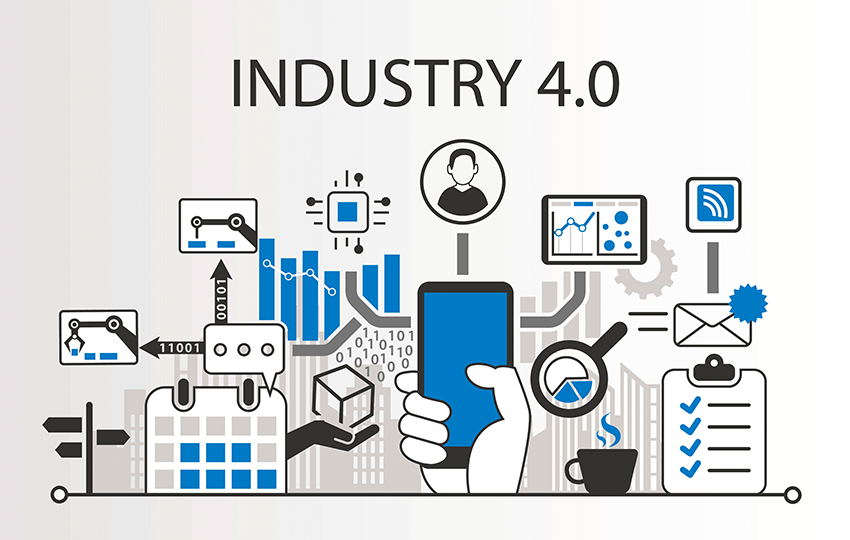advertisement
CIO 100: Get your businesses ready for the 4th Industrial Revolution
The Fourth Industrial Revolution (4IR) is the fourth major industrial era since the initial Industrial Revolution of the 18th century. It is characterized…

The Fourth Industrial Revolution (4IR) is the fourth major industrial era since the initial Industrial Revolution of the 18th century. It is characterized by a fusion of technologies that is blurring the lines between the physical, digital, and biological spheres, collectively referred to as cyber-physical systems. For businesses to prepare for industry 4.0 the best starting point is in the developing of their employee’s digital skills. This will be one of the big-ticket discussions at the CIO100 Symposium and awards next week led by industry captains and senior business leaders.
Click here to register and attend the upcoming CIO 100 Annual Symposium and Award
The fourth wave of the industrial revolution will be charactarised by a heavy implementation of several emerging technologies with a high potential of disruptive effects. It has been widely reported that the fourth industrial revolution could lead to many jobs being replaced by robots or AI, however, in industries and sectors such as digital technology the opposite could be true, according to recruiting experts, Hays.
advertisement
The advancement of technology continues to change and shape the world we live in, this has led to questions about the possible implications for employees as some roles look to be affected by the automation of the workforce. However, as new technologies continue to emerge and change the way the way we work, many new and exciting opportunities could be created for those with digital tech skills as some roles within the sector evolve too.
Tom Osborne, Regional Director of Hays in Malaysia says, “With each new industrial revolution we have seen a shift in the types of jobs within the affected sectors. While we can expect some roles to become extinct, demand will be created for newer roles essential to the running of the new technology. Those with digital technology skills will be in high demand and could reap the rewards.”
Tom Osborne provides some of the potential implications for the digital recruitment sector:
-
Developers who understand AI will be in high demand
Businesses will need developers who are not only capable of the technical aspects of the job, but developers who are able to spot the wider business opportunities too. So the candidates in greatest demand will be those able to tailor AI applications to enhance companies and optimise business processes.
advertisement
-
Increasing need for digital project team members
Team members, such as product owners/managers, channel managers and other similarly highly skilled talent will also find themselves in high demand. The delivery method for AI-based projects more than likely continue to be Agile, increasing demand for those with the right experience.
-
Increased use of AI and automation in the technology industry
The tech industry is already realising the benefits of AI and automation, especially those operating within areas such as IoT, big data or FinTech. This again is resulting in increased demand for those candidates with experience of these technologies.
-
Heavy reliance on the tech industry to provide business-ready solutions
Companies looking to improve efficiency through AI or machine learning will need the tech industry to deliver the right solutions quickly and efficiently. This will present those in development with a great opportunity.
advertisement
Click here to register and attend the upcoming CIO 100 Annual Symposium and Award
-
The challenge of finding and keeping top talent
In this skill-short market, companies are already experiencing difficulties in attracting and retaining top talent. Much more will need to be done to attract future generations and ensure there is a talent pipeline for the future.
-
New industries will be born
There are many jobs in existence today that didn’t exist ten or even five years ago. With the continued advancement of technology we must be prepared for new roles, even industries, to be created and ensure we have the talent with the necessary skills.
-
Cybersecurity will be a major focus
As the workplace becomes more and more digitalised, companies will need to make sure their cybersecurity stands up to any potential attacks. So having the necessary skills and experience in place is a must for any business.
-
Increased recruitment by start-ups
Any start-up experiencing exponential growth will need a highly skilled workforce. They will need to recruit them quickly as the start-ups look to capitalise on their growth. This will be good news for contractors, whose flexibility will be attractive.
“It’s important that businesses keep up with the demand that the fourth industrial revolution will bring and that it doesn’t leave any negative impact on the current workforce. This means upskilling current employees and looking at potential regulations to safeguard workers.” Osborne concluded.
Click here to register and attend the upcoming CIO 100 Annual Symposium and Award